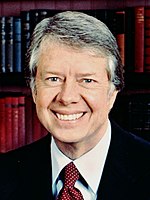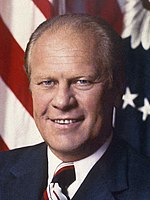This article needs additional citations for verification. (September 2023) |
| |||||||||||||||||||||||||||||
538 members of the Electoral College 270 electoral votes needed to win | |||||||||||||||||||||||||||||
|---|---|---|---|---|---|---|---|---|---|---|---|---|---|---|---|---|---|---|---|---|---|---|---|---|---|---|---|---|---|
| Turnout | 54.8%[1] | ||||||||||||||||||||||||||||
| |||||||||||||||||||||||||||||
 Presidential election results map. Blue denotes states won by Carter/Mondale and red denotes those won by Ford/Dole. Pink is the electoral vote for Ronald Reagan by a Washington faithless elector. Numbers indicate electoral votes cast by each state and the District of Columbia. | |||||||||||||||||||||||||||||
| |||||||||||||||||||||||||||||
The 1976 United States presidential election was the 48th quadrennial presidential election, held on Tuesday, November 2, 1976. The Democratic nominee, former Georgia governor Jimmy Carter, narrowly defeated incumbent Republican President Gerald Ford. This was the first presidential election since 1932 in which the incumbent was defeated, as well as the only Democratic victory of the six presidential elections between 1968 and 1988.
Ford ascended to the presidency when Richard Nixon resigned in 1974 in the wake of the Watergate scandal, which badly damaged the Republican Party and its electoral prospects. Ford promised to continue Nixon's political agenda and govern as a moderate Republican, causing considerable backlash from the conservative wing of his party. This spurred former California governor Ronald Reagan to mount a significant challenge against him in the Republican primaries, in which Ford narrowly prevailed.[2] Carter was unknown outside of his home state of Georgia at the start of the Democratic primaries, but he emerged as the front-runner after his victories in the first set of primaries. Campaigning as a political moderate within his own party and as a Washington outsider, Carter defeated numerous opponents to clinch the Democratic nomination.[3]
Ford pursued a "Rose Garden strategy" in which he sought to portray himself as an experienced leader focused on fulfilling his role as chief executive.[4] On the other hand, Carter emphasized his status as a reformer who was "untainted" by Washington.[5] Saddled with a poor economy, the fall of South Vietnam, and the political fallout from the Watergate Scandal, including his unpopular pardon of Richard Nixon, Ford trailed by a wide margin in polls taken after Carter's formal nomination in July 1976. Ford's polling rebounded after a strong performance in the first presidential debate, and the race was close on election day.
Carter won a majority of the popular and electoral votes. He was able to carry several Midwestern and Northeastern swing states, as well as all the Southern states except for Oklahoma and Virginia. Ford dominated the Western states. Carter's victory at the polls was due in part to the backlash against the Watergate scandal that still was deeply hurting Republican candidates, and with Carter's rhetoric of honesty and compassion resonating with many of those voters who felt distrustful of politics post-Watergate. Ford also suffered from the popular lampooning of him as a stumbling boob by Chevy Chase on Saturday Night Live despite the fact that he had been an All-American Football player at the University of Michigan. Ford became the only president to ever fail to win a national election as president or vice president.
As of 2020, this is also the last election in which the Democratic candidate won the majority of states in the South, carrying the states of Alabama, Mississippi, South Carolina, and Texas (mainly due to Carter's southern roots), and the most recent election in which the losing candidate carried more states than the winning candidate. This is the only election in which California voted Republican while Ohio voted Democrat, the last time West Virginia went Democratic by more than 15 points, as well as this, and 1988 being the only elections Democrats did better in Maine's 2nd District than in the 1st.
- ^ "National General Election VEP Turnout Rates, 1789-Present". United States Election Project. CQ Press. Archived from the original on November 14, 2016. Retrieved February 21, 2023.
- ^ "1976 Ford Presidential Campaign - Republican Convention". www.fordlibrarymuseum.gov. Archived from the original on August 13, 2024. Retrieved July 23, 2024.
- ^ "Jimmy Carter: Campaigns and Elections | Miller Center". millercenter.org. October 4, 2016. Retrieved July 23, 2024.
- ^ "1976 Ford Presidential Campaign - General Election". www.fordlibrarymuseum.gov. Archived from the original on May 15, 2024. Retrieved January 27, 2024.
- ^ Jackson, Harold (November 20, 2023). "Rosalynn Carter obituary". The Guardian. ISSN 0261-3077. Retrieved January 27, 2024.
Cite error: There are <ref group=lower-alpha> tags or {{efn}} templates on this page, but the references will not show without a {{reflist|group=lower-alpha}} template or {{notelist}} template (see the help page).

